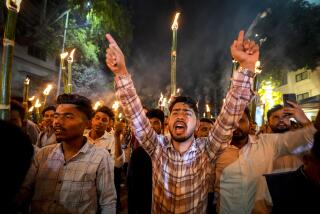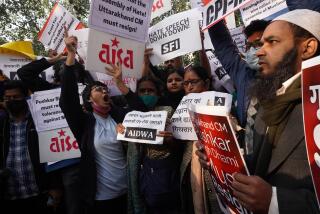New Laws Give India’s Untouchables Seat at the Table
- Share via
MORADABAD, India — At dawn, Kamala Devi emerges from a mud hut ringed by stinking puddles of stagnant water and sets off to clean the sewers of her village.
Devi, who is 50 but looks older, is an Untouchable, the lowest rung on the inflexible hierarchy of the Hindu caste system. She and the 200 million other Untouchables in a population of 880 million were condemned at birth to live as scavengers, cleaners of human feces, cremators of the dead.
Discrimination by caste was outlawed when India became independent of Britain in 1947, but the practice persists, especially in the villages where two of every three Indians live.
Now the system is under attack. In April, all Indian states ratified a constitutional amendment giving Untouchables a voice in the management of their villages and reserving one-third of the seats in every village council for the lowest castes.
It also requires that one-third of council seats be filled by women, now represented only rarely.
Village landlords are not likely to relinquish power easily, and can be expected to manipulate some lower-caste council members after elections later this year.
Even so, supporters say the amendment will do more to undermine the caste system than anything since Mahatma Gandhi, the independence leader, adopted the cause of Untouchables and called them Harijans, or children of God.
“It is an opportunity to gain control of their lives,” said Arun Ghosh, a retired economics professor at Lucknow University and expert on local government.
L.C. Jain, a former member of the federal planning commission, said the new law could break the authoritarian structure of villages, where landowners have had the power of feudal lords.
Like Akka Dilari, 10 miles north of Moradabad in northern Uttar Pradesh state, most villages have paved streets, electricity and television.
But the paved streets and electric cables lead only to the homes of the landlords. Devi still lights her one-room hut on the edge of Akka Dilari with a kerosene lamp. It is furnished with only a string bed and stools.
Pigs and dirty children scamper among the huts in the Untouchable part of the village.
Kuber Pal Singh, an upper-caste landowner who heads the village council, proudly showed his modern harvesters and tractors to visitors, then invited them into his concrete-block home to sit in the comfort of an electric fan.
Later, when his guests visited Devi, the landowner stayed outside.
“The pradhan (headman) has come close to our homes this time because there are outsiders with him,” said Devi, who as an Untouchable may not refer to Singh by his name. Even looking him in the eye would be considered an act of insolence punishable by flogging.
Under Hinduism’s ancient rules, people of different castes may not eat together or even sit at the same table, drink from the same well or mingle socially.
The constitutional amendment allows Devi and other Untouchables to run for village councils and speak at their meetings. Singh will have to sit at the same table with Untouchable council members if he wants to stay in office.
Village councils have existed for centuries, but most were either filled with people from the upper castes or with people appointed and controlled by them.
Although villagers, along with everyone else, won the right to vote when India became independent, many do not vote in local elections for fear of antagonizing the landlords. Others vote as instructed by village leaders.
In addition to giving Untouchables a say in their local governments, the constitutional amendment empowers village councils to decide how federal and state development money will be spent.
Until now, state bureaucrats advised by upper-caste villagers determined where wells would be dug and schools built. Corruption was rampant.
“The state officials often fudge accounts, and when they make our buildings they use mud, not cement,” said Rai Singh, a leader in Thimri, a village of 4,500 people.
“Whatever else happens, the villagers will stand to benefit from the change.”
More to Read
Sign up for Essential California
The most important California stories and recommendations in your inbox every morning.
You may occasionally receive promotional content from the Los Angeles Times.













